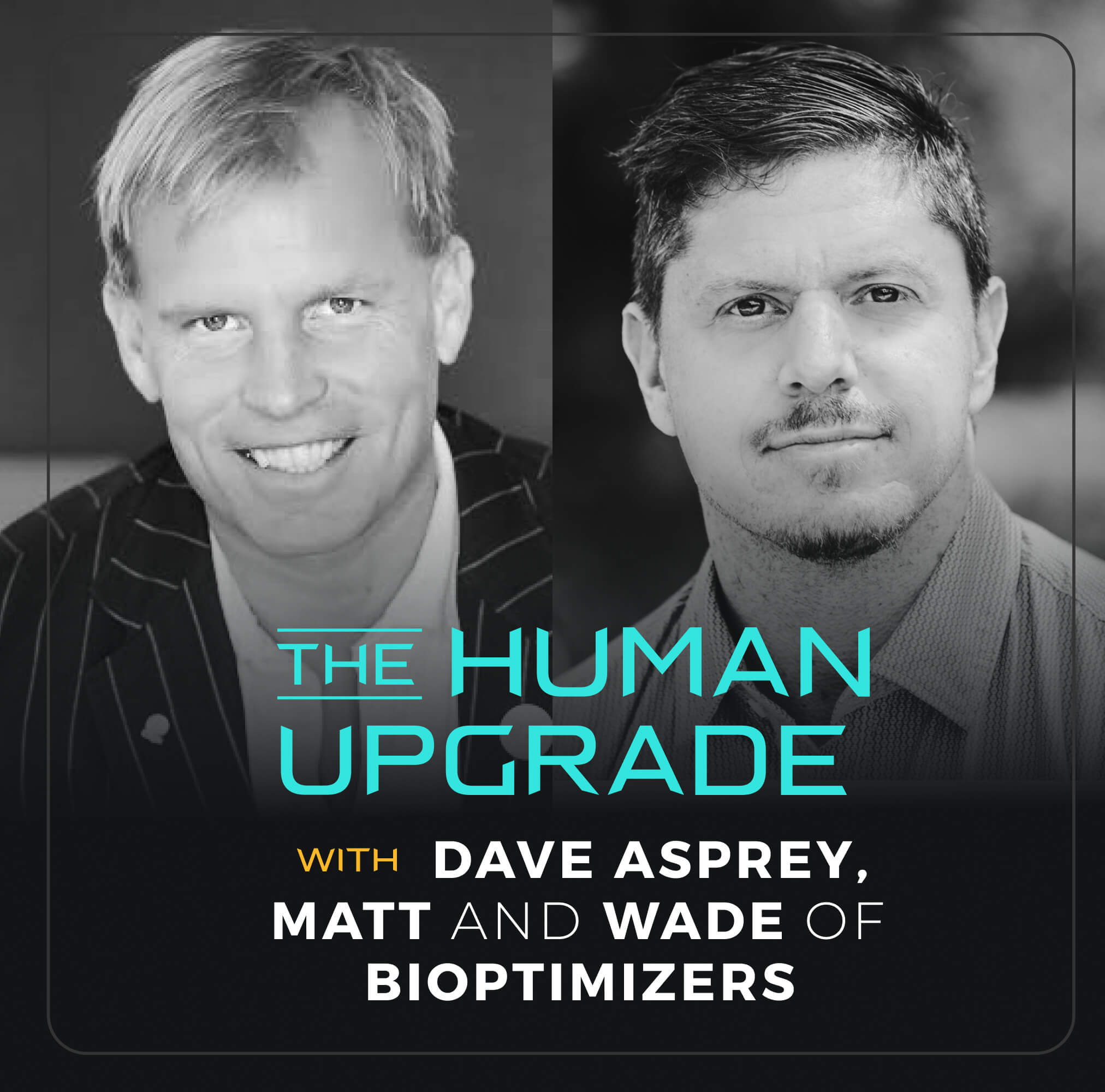In this Episode of The Human Upgrade™...
Remember the days when we believed in one-size-fits-all diets? Well, thankfully those days are behind us. Today’s episode is all about the crucial shift towards personalized nutrition.
Our guests, Matt Gallant and Wade Lightheart from BiOptimizers, are no strangers to the show. They’re also the authors of The Ultimate Nutrition Bible, a monumental resource that unlocks the secrets of crafting a diet tailored precisely to your genetics, goals, and lifestyle.
We delve into the art and science of creating your perfect nutrition plan, exploring the intricate web of genetics, gut health, and lifestyle, and how they all intertwine to shape your dietary needs. Imagine a diet designed exclusively for you, based on your unique genetic makeup and aspirations. It’s a paradigm shift for sure; we’re here to guide you through it using the latest scientific studies and findings from our personal experiences with biohacking.
In this episode, we uncover the importance of aligning your diet with your lifestyle, debate the calories-in vs. calories-out method of losing weight, and share practical insights for how to measure your progress from The Ultimate Nutrition Bible. Plus, we dispel the myth that excessive cardio is the fastest way to lose body fat, and explore the pivotal role of hormones and metabolism for sustainable, safe weight loss.
“The body becomes its function—is something people have to recognize.”
WADE LIGHTHEART
00:00:21
Introducing the Ultimate Nutrition Bible: There’s No Evil Foods
- The Ultimate Nutrition Bible by Matt Gallant and Wade Lightheart
- Sleep Breakthroughs, Stacks & Solutions – Matt Gallant / BiOptimizers – #996
- A New Way to Control Your Blood Sugar – BiOptimizers with Dave Asprey – #807
- BiOptimizers Kapex and BiOptimizers Gluten Guardian
00:10:54
Why Raw Food & Ketogenic Diets Are Not for Everybody
- Being aware of potential deficiencies for every diet
- The Science of the Perfect Physique at any Age: Mr. Olympia Frank Zane #506
00:19:30
The Consequences of a Performance Diet & Starvation Survival Mechanisms
- Understanding Metabolism by Scott Abel
- The cost of low body fat for female bodybuilders
- Reverse dieting to rebuild metabolism
- Using testosterone or hormone augmentation
00:33:32
Exploring the Calories-In, Calories-Out Method for Weight Loss
- Variables that impact calories out
- 40 years of Zen
- Balancing metabolism and hormones
00:41:05
Understanding Metabolic Adaptation: How Excessive Cardio Prevents Fat Loss
00:46:08
How High Quality Sleep Can Aid Weight Loss
- Dave’s journey with supporting thyroid function
00:51:33
The Simplest Secret for Tracking Your Progress
00:56:32
Breaking Down Calories vs. Macros in the Ketogenic Diet
01:00:53
Identifying Hormone Issues Based on Weight Distribution
- Ways to minimize inflammation during travel
- Balance hormones while traveling
01:05:22
Taking Risks to Achieve Optimal Results
Resources
Dave Asprey’s NEW Book ‘Smarter Not Harder’ is out now: https://daveasprey.com/books
The Ultimate Nutrition Bible: ultimatenutritionsystem.com/dave
Read: The Ultimate Nutrition Bible by Matt Gallant and Wade Lightheart
Website: bioptimizers.com
Instagram: @bioptimizers
YouTube: BiOptimizers
Blog: bioptimizers.com/blog
Podcast: Awesome Health Podcast
Enjoy the show!
LISTEN:
“Follow” or “subscribe” to The Human Upgrade™ with Dave Asprey on your favorite podcast platform.
REVIEW:
Go to Apple Podcasts at daveasprey.com/apple and leave a (hopefully) 5-star rating and a creative review.
FEEDBACK:
Got a comment, idea or question for the podcast? Submit via this form!
SOCIAL:
Follow @thehumanupgradepodcast on Instagram and Facebook.
JOIN:
Learn directly from Dave Asprey alongside others in a membership group: ourupgradecollective.com.
Subscribe To The Human Upgrade
Similar Episodes

BOOKS
4X NEW YORK TIMES
BEST-SELLING SCIENCE AUTHOR
Smarter
Not Harder
Smarter Not Harder: The Biohacker’s Guide to Getting the Body and Mind You Want is about helping you to become the best version of yourself by embracing laziness while increasing your energy and optimizing your biology.








